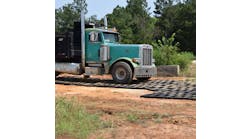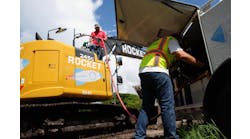Trucks customized to a contractor's specific application can help crews and equipment work at full capacity while avoiding missed deadlines, voided warranties and unnecessary capital outlays.
While a decade or two ago construction, mining, site preparation and earthmoving contractors may still have had the luxury of maintaining their equipment fleet at centralized locations, supplemented with handheld greasers or cans of oil onsite, that's no longer true today. As bids in the business are now highly competitive and margins low, especially in today's soft economy, successful managers must track work-cycle times as never before. In most cases, that means accurately estimating how much dirt each operator will move with each machine per day, based on trips from a dig site to, say, a dump truck. Any interruption of the work cycle, for example a hydraulic hose break in a front loader, could cost thousands of dollars per day per incident. For this reason, efficient, onsite preventive maintenance and repair--in the form of lube, fuel, water and maintenance trucks--is now essential.
"Without preventive maintenance, you're in serious trouble," said Rodger McGrady, equipment manager at Riverton Coal's Charleston, W.V., location. "Oil needs to be checked daily, as do bearings and moving parts. Neglecting to do so can ruin engines, transmissions, differentials or drivelines, especially for the heavy loads we carry. If you don't properly service and maintain your equipment, you won't be in business very long."
Not only must increasingly complex and expensive equipment be properly
maintained according to stringent warranty requirements, but also it must be done efficiently. Simply missing a maintenance interval, for example, could make a company liable for a $30,000 engine replacement, if needed.
"You can't have machines down or operators and crews standing around waiting for fuel or service," said John Mihm, equipment manager at RLO Contractors, an excavating, grading and land-clearing contractor based in Dayton, Md. "Jobs must be done efficiently and deadlines hit. To do so, equipment must be in operating shape, and most of it is designed to be checked every 10 hours or once per shift. If not, it's going to run out of fuel, lose pins and bushings from not getting greased and shorten equipment life. And if a warranty is voided from lack of proper maintenance, every dime comes out of your pocket."
It's never the same
All preventive maintenance equipment doesn't suit all contractors equally. In fact, the prevailing mentality is to find an "off-the-lot," or standard, lube, fuel, water or maintenance truck. While appearing to be a good idea, this solution often causes more problems than it solves. The reason: construction and earthmoving contractors have individual needs as distinct as their fingerprints, and "one-size-fits-all" solutions simply don't address these unique needs. Instead, customized solutions designed specifically for each owner's application are required to produce the best maintenance at the lowest cost.
Why? To begin with, type and quantity of machinery varies at each jobsite and for each company. Obviously, a coal mining operation with dump trucks capable of hauling 100 tons of coal per load will have vastly different maintenance requirements than a road contractor needing thousands of gallons of water to cool asphalt on milling equipment. A contractor readying a site for residences or commercial buildings will, in turn, have distinct needs.
Often, proper maintenance demands a unique combination of elements--for instance fuel, lube and water capabilities--to keep equipment running smoothly and project deadlines on target.
The number of factors to consider in properly outfitting preventive maintenance trucks is nearly endless: weight distribution, terrain driven, tank and pump capacity, reel length, weather and temperature requirements, storage areas for filters and waste products, as well as the need for extra lights, generators, cranes, air compressors, pressure washers and other special gears. Trying to find a "standard" off-the-lot lube, fuel, water or maintenance truck that has all the elements you need is a virtual impossibility.
"No two contractors have identical maintenance needs because their equipment, crews and applications are different," said Mihm. "Yet the lube, fuel and preventive maintenance trucks have to perform efficiently every day to keep operations running smoothly. We only want to stop machines once a day. We don't want one truck doing lubes and oil changes, with another providing fuel. Staffing two trucks to do a single job not only doubles the equipment and labor costs, but also doubles the down time. That's unacceptable."
Even slight miscalculations can be costly in terms of wasteful logistics and downtime, and could be the mistake that voids a warranty, or triggers a premature and costly repair. For example, if a site preparer needs five oil products to adequately service his fleet of equipment, does he need five 100-gal tanks, or three 100-gal tanks and two 500-gal tanks? Buying an improperly outfitted lube truck could mean failing to complete necessary lubes each day, while carrying around too much oil of other types.
Furthermore, every truck a contractor owns or uses must meet myriad federal and state regulations just to be allowed on the road.
Failure to comply with Department of Transportation (DOT), Environmental Protection Agency (EPA) or Occupational Safety & Health Administration (OSHA) regulations--not to mention the unique laws in each of the 50 states--could require extensive body, suspension or cab adjustments before road use is permitted.
To meet Maryland's tough bridge laws and to avoid a federal road use tax, for example, Mihm needed his trucks to stay under 55,000 lb fully-loaded, including oil, fuel, tools and filters, with a driver and helper in the cab.
Even minor violations can produce big headaches for contractors, who must keep work cycle times on track to turn a profit. For instance, if a fully outfitted truck exceeds federal, state or bridge weight allowances by even a small amount, the driver could be forced to stop and pump off product. This could require driving a second truck to receive excess product, which would throw an entire construction project off schedule.
Talking with the managers
When Mihm became equipment manager at RLO Contractors 14 years ago, the company was already using preventive maintenance trucks to care for its equipment fleet. But the standard trucks not only failed to fit their specific needs, but also required excessive maintenance themselves.
"The lube truck breakdowns were all too common," said Mihm. "We suffered from poor tank welding as well as poor pump and reel quality. Leaks between the tanks caused product mixing, for example, of an engine oil with hydraulic or gear oil. We could've lost engines, hydraulic systems, final drives or had to make other serious repairs in our fleet due to the product mixing.
"On top of that, we had problems with the fuel and waste oil reels for years. We used to keep a spare reel for each truck, along with extra springs and latches, just in case."
In search of a better solution, Mihm turned to Elliott Machine Works, a manufacturer of mobile service equipment since 1948. Elliott Machine Works specializes in providing custom solutions based on individual consultations with each client. These consultations are designed to elicit exactly what is needed and wanted for each specific application, so the final product matches the needs of its owner.
At Mihm's request, Elliott Machine Works initially rebuilt lube bodies on older trucks for RLO Contractors, and then began building entire lube bodies custom-suited to their needs. Today, Elliott Machine Works custom-equips five lube trucks and one water truck for RLO Contractors' fleet of 55 trucks and 110 pieces of equipment, from excavators to skid-steer loaders, for site preparation work.
"Now every inch of our lube trucks is efficiently used, and the breakdown problems have stopped," said Mihm. "Every time we switch truck bodies for new tank sizes or to meet new regulations, we depend on Elliott Machine Works. They keep me up to date on any laws that have changed or are about to change, and on the best equipment currently available. They build our tanks, storage compartments and such to any size we require and make sure our weight distribution works out. In fact, since they build our trucks to stay under 55,000 lb, we haven't had to pay a federal road use tax for 10 years. That's about $2,000 savings per year."
For efficient lube/fuel use, one of Elliott Machine Works' features is a hydraulic dispensing system that delivers from 9 to 12 gpm of up to three products simultaneously--with a single touch of an electric-powered master switch that controls the load-sensing, pressure-compensated system. Hydraulic or pneumatic fuel pumping systems can deliver up to 90 gpm of product, and for safety fuel tanks offer flanged heads and baffles, full-length flashing and roll-over protection.
At Riverton Coal, McGrady faced a number of special concerns that standard lube or fuel trucks couldn't begin to address. Since mining operations had to continue almost 120 hours per week--on equipment capable of hauling 150 tons per load and costing more than $1 million in some cases--he had to get preventive maintenance right. Furthermore, preventive maintenance had to be done efficiently, despite 10°F overnight weather that made pumping unheated oil and grease take three times as long as normal.
McGrady found a solution with three custom-outfitted lube/fuel trucks with tanks for seven types of oil, two types of chassis grease, waste oil recovery and antifreeze. The enclosed truck bodies have heated interiors that keep the oil and grease at room temperature for fast delivery, as well as interior and exterior lights for nighttime use.
"That addressed our specific needs," said McGrady.
As equipment manager for Superior Paving, a highway construction contractor based in Gainesville, Va., Chris Griffith attends to the maintenance of more than 200 pieces of equipment from pavers and rollers to milling equipment and dump trucks. To meet their diverse maintenance needs in service of the crews that use them, Griffith also turned to custom-made maintenance vehicles. Each crew has its own truck tailored to its specific application. For example, the asphalt crew's truck carries 150 gal of diesel fuel; 1,500 gal of water; 30 gal each of hydraulic oil and engine oil; and a truckbed-mounted air compressor to run a jackhammer.
"Every truck we've got is designed for our needs and the crew running it,"
said Griffith. "The milling crew's water truck, for example, has air actuated valves at three carefully chosen discharge points at the right front, right rear and mid-ship right side. That way, the operator can simply hook up a hose, then from the cab flip a few switches without having to manually turn valves. This saves a few minutes every time he hooks up, for about one hour total time savings per day."

